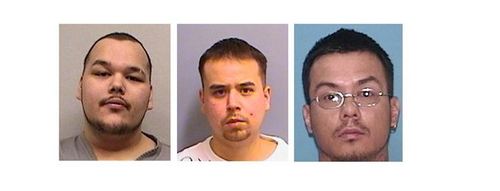
Prosecutors hope verdict will put a dent in Indian Country crime.
Article by: DAN BROWNING , Star Tribune
Updated: March 19, 2013 – 8:42 PM
Jurors in Minneapolis convicted three men of drug and gun charges Tuesday in a racketeering case targeting the Native Mob, a notoriously violent gang that started in prison and spread through Indian Country in the Upper Midwest.
So far 30 people have been convicted of crimes in an investigation that dates back to 2004. Jurors returned a mixed verdict against the three men who went to trial Jan. 22, finding two guilty on some charges but not others, and one guilty of all charges.
“The Native Mob has been a real detriment to Native American communities of Minnesota. Their game plan is to promote fear; that is the base of their power. And I think their power is diminished by this jury’s verdict,” said Assistant U.S. Attorney Steve Schleicher.
Schleicher said the effect of having numerous fellow Native Mob members testify in open court against the men is bound to make other gang members pause and realize “that they can’t trust their co-conspirators.”
Attorney Thomas Shiah was left wondering how the jury could convict his client, William Earl Morris, 25, of attempted murder and related gun charges in support of racketeering, but find him not guilty of the racketeering conspiracy itself. Morris, who is already serving a 200-month sentence in state prison on the attempted murder charge, denies being a member of the Native Mob.
“I think it creates a significant issue on appeal,” Shiah said outside of court. “I’m very happy with the not guilty verdict.”
Assistant U.S. Attorney Andrew Winter said he disagrees about the Morris verdict. “They did convict him of a very egregious crime in the aid of a criminal racketeering enterprise,” Winter said. “There’s no legal inconsistency in the verdict.”
Wakinyon Wakan McArthur, 34, a former leader of the group, was convicted of racketeering conspiracy and five gun and drug charges involving cocaine and cocaine base. But jurors found him not guilty of attempted murder, assault with a dangerous weapon and using a firearm in a crime of violence.
Anthony Francis Cree, 26, was found guilty of all charges: racketeering conspiracy, and five gun and drug charges, including attempted murder.
Jurors sat through a grueling seven-week trial involving 900 exhibits and more than 250 witnesses, including many Native Mob members who have pleaded guilty or hoped to avoid criminal charges by testifying.
Jurors found the men not guilty of selling heroin, methamphetamine and oxycodone as part of the racketeering conspiracy, but found enough evidence to convict McArthur and Cree on cocaine and crack charges.
McArthur’s attorney, Frederick Goetz, praised the jurors as “conscientious and hardworking from the beginning.” He said their not-guilty verdicts should substantially reduce the amount of prison time McArthur will face when he comes up before Judge John Tunheim for sentencing, likely several months from now.
Goetz noted that the jurors found that the racketeering conspiracy involved a relatively small amount of drugs — less than 17 pounds of cocaine and less than 10 pounds of cocaine base. The Native Mob, he said, is not like La Cosa Nostra. Goetz says he expects his client will appeal.
Praise for verdicts
Federal prosecutors said they were pleased with the verdicts, which could result in sentences of 20 years to life in prison for each man. The outcome reflects the seriousness of the Native Mob’s racketeering activities and the havoc the gang has caused from south Minneapolis to reservations in Minnesota, South Dakota and Wisconsin.
Federal prosecutors describe the Native Mob as a criminal organization that dealt drugs and spread fear, attacking rivals and informants who threatened its business.
The defense attorneys argued that the organization existed primarily to protect its members, and that any crimes they committed were random, spontaneous acts committed by violent individuals who were twisted by poverty, drug and alcohol abuse.
In the end, both sides agreed that trial proved one thing: Poverty, drugs, alcohol abuse and violence have devastated the lives of far too many Native Americans.
